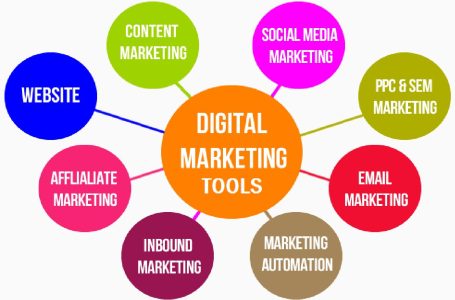The DISC test is a tool that helps to understand the different behavioural patterns of people. The acronym DISC stands for: Dominance, Influence, Stability, and Compliance.
How DISC Test Can Be Helpful In Your Management Efforts
Working with people management is not easy. After all, you must deal with different styles, generations, and profiles in the same team and extract the most from each professional to increase work productivity and achieve the company’s goals.
Fortunately a few devices can make this undertaking more productive, such as DISC.
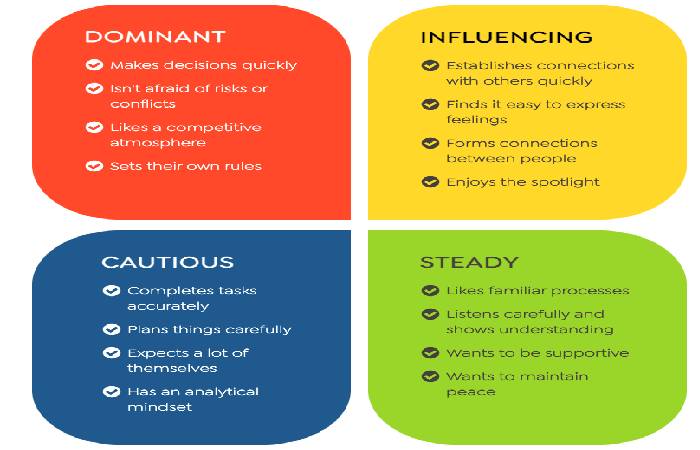
From an evaluation based on four pillars, you can, for example, identify how a specific professional can fit into your team or even what they should do to be more productive.
In practice, it is a method of evaluating collaborators and, of course, the work carried out by your team.
So what do you think about continuing to delve a little deeper into this topic, learn about the DISC assessment and know how to work with the behavioral profile of the professionals in your team?
Here are some ideas that can be valuable for this task:
What is the DISC test?
The DISC test is a tool that allows for identifying the dominant profile of the individual, is frequently used in the Human Resources sector to know the characteristics of the collaborators of a company.
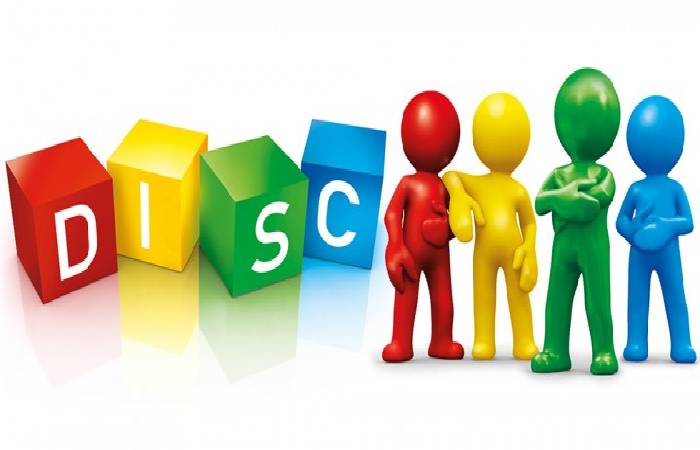
It is based on the theory of the four behaviors created by Maston.
For this reason, it is composed of questions about personal characteristics to drive the result for one of the four matrices on which the psychologist bets:
- dominance;
- influence;
- stability;
- compliance.
It can be said that the evaluation is based on psychological factors that help to evaluate the behavior of the human being, taking into account the profiles and patterns that predominate in a specific type of environment.
The evaluated person can answer the questionnaire by hand or using specific software.
Assessment responses help HR managers, recruiting professionals, and analysts. H H. to study the behavior patterns and characteristics that predominate in a collaborator or candidate for the offer vacancy and, in this way, detect what can be improve.
What is the impact of the behavioral profile on the company?
Companies must do everything to qualify in an increasingly competitive scenario, which includes digital transformation and extremely demanding consumers in terms of what they buy – be it products or services.
For a manager, this means making the most of his budget and making the best possible use of the resources available to his team.
This work is not just about finding the best tools and processes or adopting the most efficient Digital Marketing strategies.
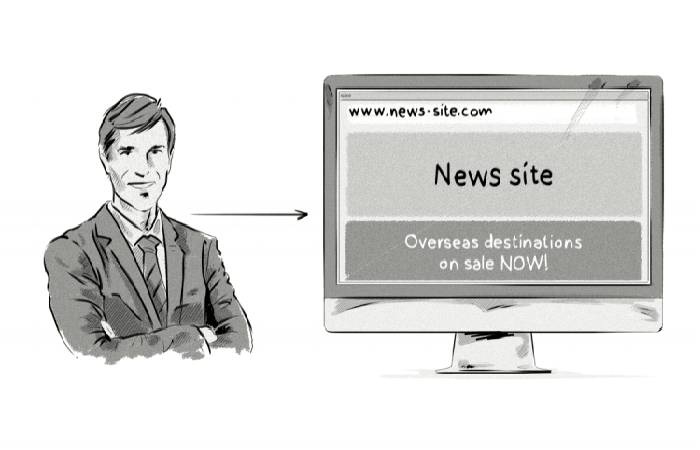
After all, your team is made up of people and deciphering that behavior can be vital. Understanding how to stimulate collaborators and what is the profile of each one of them is a must.
What is the use of having fully qualified professionals if, in practice, they do not perform enough?
The reasons for poor performance can be diverse, such as adaptation to your company’s organizational culture or even the collaborator’s capacity to occupy or not occupy a specific function.
Therefore, the DISC assessment can be helpful.
In addition to remuneration, lack of recognition, professional stagnation, and low productivity are the leading causes of employee dissatisfaction in different Latin American countries.
In other words, they are problems that can be solved by understanding the behavioral profile of the collaborators.
After all, placing each professional in a position that is more suitable for them, for example.
Will increase their productivity and satisfaction in the work environment, also helping to retain the company’s talents.
What are the 4 behavioral profiles of the DISC assessment?
The first time the concept of DISC appeared was at the end of the 1920s in the book The Emotions of Normal People, written by psychologist William Moulton Marston, the same creator of Wonder Woman.
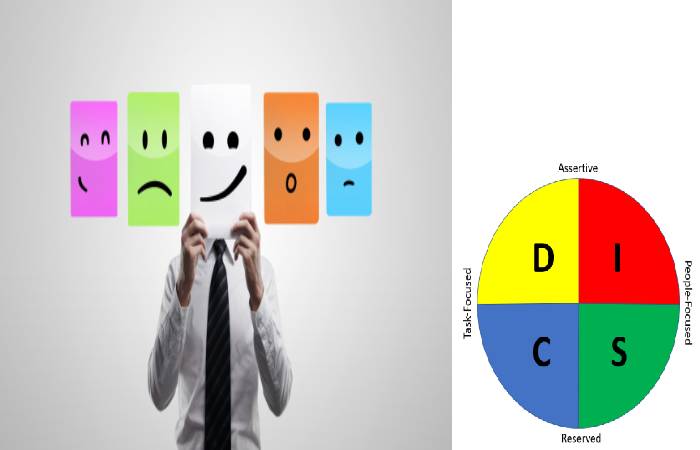
It is one of the most accurate assessment tools and tries to understand individuals’ behavioral patterns better.
This has several uses, and for example, Human Resources teams can use this evaluation in a recruitment process or identify the points that collaborators must develop.
It can also contribute to improving internal communication and understanding among the professionals on your team.
Motivation, management, orientation, in short, the possibilities of using DISC are the most varied. But in practice, what does this acronym mean?
Dominance, Influence, Stability, and Compliance are the 4 behavioral profiles used within this concept, and, therefore, we will explain what each one means.
Dominance
The first indicator shows how the professional behaves in challenging situations or when solving problems.
Normally, this competence stands out for characteristics such as competitiveness, determination, demand, and control over certain situations.
Influence
On the other hand, influence reflects how the individual acts about the different components of a team or clients, for example.
In practice, it represents the ability to exert influence over other people, either to land a job vacancy or to make a sale. Persuasion, optimism, and enthusiasm are its main characteristics.
Stability
This profile is related to reactions to standards, routines, and, of course, the ability to deal with changes, for example.
Loyalty, persistence, team spirit, and consistency are the primary descriptors of this factor.
Compliance
Discipline, precision, analytical and careful work are common characteristics of those who have this profile.
Compliance is an indicator of how the professional reacts to what others establish, such as the rules and processes within a company.
How does the DISC test work?
But, in practice, how does the DISC test work? The first step is to understand that the result will not be good or bad. It simply indicates what the professional’s behavioral profile is.
The result alone does not have its meaning, and it is up to the evaluator to understand, for example, the best position or function for that collaborator.
THEREFORE, the DISC test can be use to find a professional on your team to manage a particular project, for example, a leadership position.
The profile serves as a guide to how that person behaves in certain situations and, thus, to understand if they are the most suitable for carrying out a job.
Straightforwardly, only one question is asked in this evaluation: «which of the following words best defines your behavior?.
It is generally repeated between 15 and 30 times, according to the depth and objective of the person taking the questionnaire.
What changes are the answers, which always have four alternatives in multiple-choice?
The idea is that the professional responds quickly, without evaluating much, in a natural, objective, and direct way.
Normally, the four answer possibilities are quite different, such as: “calm, sociable, energetic or methodical?”.
Then the same question is repeated, and other options appear: “organized, confident, shy or spontaneous?”
After the last question, you will have one of the four profiles: dominance, influence, stability, and compliance as a dominant result.
Which will tell the person responsible for the test what the best way to deal with you is.
What is the purpose of DISC?
- Increasingly used by companies, the DISC assessment is established as a handy tool to identify the behavioral profile.
- Its application helps to understand better how a professional behaves in certain everyday situations, according to the context in which they are.
- As a result, the DISC test provides benefits for both the professional and the business.
- This occurs because it allows us to verify the most appropriate attitudes and which ones must be perfect.
- In this way, there is a better basis for creating an efficient personal development project.
- Which helps the individual achieve their goals and dreams and has a greater chance of success.
What are the best tips to deal with the behavioral profile of employees?
With the results ready, it’s essential to use them correctly, right?
For this reason, we separate some tips so that you know how to deal with the behavioral profile of each collaborator and, thus.
You can make the most of the DISC test, enhancing all the work done within your team or even your entire company.
Do A/B tests on the operation of the equipment
The A/B tests are widely in use in marketing. But they can also be helpful for people management work.
For example, in a sales team, you can create a team to deal with older customers and, after a month, change some professionals.
Next, you will buy some indicators and discover which ones fit the best.
Create an individual development plan
More suitable for those professionals who do not dominate a behavioral profile.
The individual development plan (PDI) is an excellent solution to stimulate more analytical thinking and stability.
In other words, those who want data, information, and solutions that help them grow professionally.
Take endomarketing actions
- Some professional profiles, such as those with dominant stability and compliance, know how to deal well with stimuli and actions.
- Therefore, investing in some Endomarketing (or Internal Marketing) practices can contribute to creating a closer and more stable relationship with these collaborators and being helpful to motivate them.
- THEREFORE, the DISC test is an excellent ally for any manager who is always attentive to their team’s performance and does everything to improve the performance of each professional.
- With the variety of applications of this methodology.
- It is likely to find one that best fits your company’s objectives, profile, and needs.
- Applying this concept ends up impacting various situations and sectors within an organization.
- For example, it permits you to create a favourable climate to keep the best professionals on your team.
Is it important to know your behavioural profile?
- Knowing your behavioural profile provides you with various benefits for your personal and professional life.
- First of all, you have more self-knowledge, a better understanding of all your potential.
- How you react to day-to-day circumstances, and what you need to improve.
- According to Tomas Chamorro-Premuzic and Dave Winsborough.
- In a text published in the Harvard Business Review magazine.
- Knowing your personality helps professionals improve their ability to work as a team.
- Since it is possible to better adapt to the work environment.
- In addition, using DISC is a starting point for your personal development.
- It allows you to identify negative and positive behaviours and work to correct weaknesses.
- Allowing you to direct your actions, studies, and career.
- Not to mention this process is also essential for those who want to assume leadership positions.
- Since by becoming aware of your characteristics.
- You understand what type of leader you will be and how you can involve people.
- Without self-knowledge, it isn’t easy to define objectives, make decisions and execute more accurate actions, essential to growing professionally.
- With the application of the DISC test, a more appropriate location can be adopted for the environment in which it operates.
- How about learning other techniques and learning everything you need to create great marketing teams?





